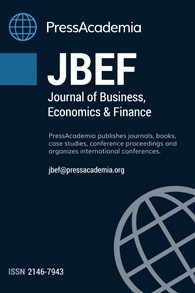CREDENCE TO LEADER AFFECTING DESIRED LEVEL OF COMMITMENT: THE MODERATING EFFECT OF EMPLOYEE’S CYNICISM ABOUT ORGANIZATIONAL CHANGE
Purpose- Credence to truthful leader increases employee’s commitment level to organization. The over committed members of organizations might cause to performance loss. Natural attitudes such as employee’s cynicism about organizational change could be used to moderate organizational commitment. As credence to the leader reduces the cynicism level it would be possible to control the effectiveness of cynicism to change and use it. Methodology- To test the propositions, a case study has been arranged on an industry leading dressing retail company located in Turkey in 2016. After the validation of measures a series of regression analysis was conducted to test the hypotheses and to define the direction of relations. Findings- The obtained data from the questionnaires were confirmed the predicted relationships from credence to leader to organizational commitment level, and employee’s cynicism about organizational change moderated this relation. Conclusion- The study was one of the first attempts to propose managers to use cynicism which lose strength by experience of employees and credence to leader for organizational performance.
___
- Abraham, R. (2000). Organizational cynicism: Bases and consequences, Genetic, Social and General Psychology Monographs, 126, 269–292.
- Allen, N. J. and Meyer, J. P. (1990). The measurement and antecedents of affective, continuance and normative commitment to the organization, Journal of Occupational Psychology, 63(1), 1-18.
- Andersson, L. M. and Bateman, T. S. (1997). Cynicism in the workplace: Some causes and effects. Journal of Organizational Behavior, 18, 449–469.
- Barton, L. C., , & Ambrosini, V. (2013). The moderating effect of organizational change cynicism on middle manager strategy commitment, The International Journal of Human Resource Management, 24 (4), 721-746.
- Battistelli, A., Montani, F., Odoardi, C., Vandenberghe, C., & Picci, P. (2014). Employees' concerns about change and commitment to change among Italian organizations: the moderating role of innovative work behavior, The International Journal of Human Resource Management, 25 (7), 951-978.
- Bommer, W. H., Rich, G. A., & Rubin, R. S. (2005). Changing attitudes about change: Longitudinal effects of transformational leader behavior on employee cynicism about organizational change, Journal of Organizational Behavior, 26 (97), 733-753.
- Brown, M. E., Treviño, L. K., & Harrison, D. A. (2005). Ethical Leadership: A Social Learning Perspective for Construct Development and Testing, Organizational Behavior and Human Decision Processes, 97, 117-134.
- Brown, M., & Cregan, C. (2008). Organizational change cynicism: The role of employee involvement, Human Resource Management, 47 (4), 667-686.
- Buchanan, B. (1974). Building organizational commitment: The socialization of managers in work organizations, Administrative science quarterly, 19 (4), 533-546.
- Chiaburu, D. S., Peng, A. C., Oh, I. S., Banks, G. C., & Lomeli, L. C. (2013). Antecedents and consequences of employee organizational cynicism: A meta-analysis, Journal of Vocational Behavior, 83 (2), 181-197.
- Dean, J. W., Brandes, P., & Dharwadkar, R. (1998). Organizational cynicism. Academy of Management Review, 23, 341–352.
- Gini, A. R. (1975). Philosopher as model. The Journal of Pre-College Philosophy, 1 (4), 55-59.
- Gini, A. R. (2013). My job, my self: Work and the creation of the modern individual, Routledge.
- Green, P. E., Tull, D. S., & Albaum, G. (1988). Research for marketing decisions, Prentice-Hall, Englewood Cliffs, NJ.
- Gündüz, E. (2013). The Competitive Tension as a Moderator for Strategic Innovation, Procedia - Social and Behavioral Sciences Elsevier, 99 (6), 553-561.
- Harari, Y. N. (2016). Homo Deus: A brief history of tomorrow, Random House.
- Işık, Ö. G. (2014). Organizational Cynicism: A Study among Advertising Agencies, Akdeniz İletişim, 22, 130-151.
- Johnson, J. L., & O’Leary-Kelly, A. (2003). The effect of psychological contract breach and organizational cynicism: Not all social exchange violations are created equal, Journal of Organizational Behavior, 24, 627–647.
- Kouzes, J., & Posner, B. (2012). The Leadership Challenge: How to Make Extraordinary Things Happen in Organizations, John Wiley & Sons.
- Levine, J.M., & Moreland, R.L. (2006). Small Groups, Psychology Press, New York and Hove.
- Meindl, J. R., Ehrlich, S. B., & Dukerich, J. M. (1985). The romance of leadership, Administrative science quarterly, 30 (1), 78-102.
- Randall, D. M. (1987). Commitment and the Organization: The Organization Man Revisited, Academy of Management Review, 12 (3), 460471.
- Reichers, A. E., Wanous, J. P., & Austin, J. T. (1997). Understanding and managing cynicism about organizational change, The Academy of Management Executive, 11 (1), 48-59.
- Scott, W. G., & Hart, D. K. (1979) Organizational America, Boston: Houghton Mifflin.
- Song, G., Min, S., Lee, S., & Seo, Y. (2017). The effects of network reliance on opportunity recognition: A moderated mediation model of knowledge acquisition and entrepreneurial orientation, Technological Forecasting and Social Change, 117, 98–107.
- Sullivan, J. (1988). Three roles of language in motivation theory, Academy of Management Review, 13, 104-115.
- Tolay, E., Dalkılıç, O. S., & Sezgin, O. B. (2017). Örgütsel Değişim Sinizmi: Ölçek Geliştirme, Güvenilirlik ve Geçerlilik Çalişmasi, Atatürk Üniversitesi İktisadi ve İdari Bilimler Dergisi, 31, 1.
- Wanous, J. P., Reichers, A. E., & Austin, J. T. (1994). Organizational Cynicism: An Initial Study, in Academy of Management Proceedings, 1994 (1), 269-273.
- Wanous, J. P., Reichers, A. E., & Austin, J. T. (2000). Cynicism about organizational change, Group and Organization Management, 25 (2) 132–153.
- Zhu, W., Heb, H., Treviño, L. K., Chaod, M. M., & Wang, W. (2015). Ethical leadership and follower voice and performance: The role of follower identifications and entity morality beliefs, The Leadership Quarterly, 26, 702-718.
- Yayın Aralığı: Yılda 4 Sayı
- Başlangıç: 2012
- Yayıncı: PressAcademia
Sayıdaki Diğer Makaleler
Murat Taha BİLİSİK, Gulizar OZKAYA ELİBOL
Müjdelen İ. YENER, F. Gulruh GURBUZ, Pinar ACAR
Hulya GUNDUZ CEKMECELİOGLU, Ozgun OZTURK ILHAN, Ayse GUNSEL
Zeynep ILHAN DALBUDAK, Murat ATAN, Veysel YILMAZ
Ayse Nurefsan YUKSEL, Emine SENER
Alev KOCAK ALAN, Ebru TUMER KABADAYI, Selen BAKİS, Sabina IBRAHİMOVİC ILDOKUZ
